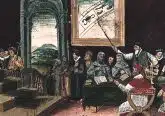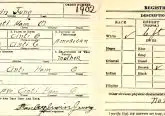Let the Scavenger Hunt Begin!
Researching family history can be daunting, however, examining clues your ancestors left behind can be both challenging and exciting. Here’s your opportunity to become the family historian detective as you examine evidence found during your scavenger hunt.
KEEP TRACK OF YOUR RESEARCH.
To begin, print out several of the following research forms (free at Ancestry.com):
- Research Extract: pdf (ancestrycdn.com)
- Source Summary: pdf (ancestrycdn.com)
- Family Group Sheet: pdf (ancestrycdn.com)
On each form, enter the family surnames you listed on your ancestral pedigree chart, and enter their source (Refer to “What is Genealogy?” in The Catholic Telegraph, January 2024). For example, if you referenced your family Bible, the source would be “Family Bible.” Listed names are entered on the Family Group Sheet with the relevant details, such as birth, marriage, christening and death.
SOURCES FOR RESEARCH.
Family facts may be sitting on shelves or stored in desk drawers waiting to be found. While sleuthing out documents, it is important to follow a “Basic Code of Evidence,” which separates fact from myth or family folklore. Research sources are considered primary or secondary. Primary sources are events documented as they happen, such as death, marriage and sacramental certificates. Primary source evidence is considered accurate and usually has a seal on the document. Secondary sources, such as a marriage license, extract information from a primary source, such as a marriage certificate. Census records are secondary research resources if the enumerator misspelled the surname.
EXAMINE EVERY DOCUMENT WITH A SKEPTICAL EYE.
It’s exciting to find an ancestor’s old records! You may discover new and interesting information, but, as with all your detective work, don’t assume that because the data is in print, it’s accurate. You’ve got to first evaluate what’s in front of you. Who filled out the form? Weigh the evidence and decide what you can trust, then record the information on the appropriate forms. Always leave the original documents intact. Consider arranging access to a scanner, digital camera or a smartphone to record and file your information.
MOST IMPORTANT DOCUMENTS:
- Cemetery records
- Census forms
- Citizenship papers
- Deeds
- Military Records
- Passenger ship lists
- Religious records
- School records
- Wills
- Vital records (birth, marriage and death certificates
After your initial scavenger hunt, you may need to write to or visit libraries, archives (including the Archdiocese of Cincinnati Archives), government offices and courthouses—some charge a small fee to access. This process is called a “document search.”
However, before trekking off to various archival repositories, there’s a lot more ancestral “hunting” to do. Don’t just look for documents
Ancestors are notorious for leaving clues. Check between the pages of family Bibles for newspaper clippings and holy cards; the latter lists not only obituary and funeral information, but usually also includes birth and death dates. Additional suggestions for finding hidden family facts include: handwritten inscriptions in books, Knights of Columbus activities, organization’s memberships, the backs of photographs, property records and baby books. Elevate your research to the next level.
Invite family members to join in a “treasure hunt.” Heirlooms are special mainly because they played a part in a family’s past. Often, they are handed down through several generations and may not have monetary value. Quilts that have been in the family for a long time might have names with birth dates embroidered onto them. Other heirloom treasures could include musical instruments, timepieces, coins and furniture like a hope chest. The possibilities are endless.
Be sure to annotate and photograph treasures found. Happy hunting!
NEXT UP:
Making Sense of the U.S. Census! It’s time to debunk the myth that last names were changed at Ellis Island.
 Ruthy Trusler is a communication consultant with a passion for genealogy. For over 20 years, she has helped families document their ancestry and write their family legacies.
Ruthy Trusler is a communication consultant with a passion for genealogy. For over 20 years, she has helped families document their ancestry and write their family legacies.
This article appeared in the February 2024 edition of The Catholic Telegraph Magazine. For your complimentary subscription, click here.













